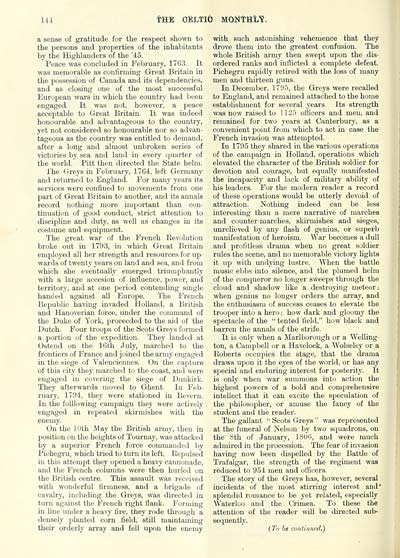Blair Collection > Celtic monthly > Volume 5, 1897
(208)
Download files
Complete book:
Individual page:
Thumbnail gallery: Grid view | List view

U4
*B[JE OIELTIO MONTSL"?.
a sense of gratitude for the respect shown to
the persons and properties of the inhabitants
by the Highlanders of the '45.
Peace was concluded in February, 1763. It
was memorable as confirming Great Britain in
the possession of Canada and its dependencies,
and as closing one of the most successful
European wars in which the country had been
engaged. It was not, however, a peace
acceptable to Great Britain. It was indeed
honourable and advantageous to the country,
yet not considered so honourable nor so advan-
tageous as the country was entitled to demand,
after a long and almost unbroken series of
victories by sea and land in every quarter of
the world. Pitt then directed the State helm.
The Greys in February, 1764, left Germany
and returned to England. For many years its
services were confined to movements from one
part of Great Britain to another, and its annals
record nothing more important than con-
tinuation of good conduct, strict attention to
discipline and duty, as well as changes in its
costume and equipment.
The great war of the French Revolution
broke out in 1793, in which Great Britain
employed all her strength and resources for up-
wards of twenty years on land and sea, and from
which she eventually emerged triumphantly
with a large aecesion of influence, power, and
territory, and at one period contending single
handed against all Europe. The French
Kepublic having invaded Holland, a British
and Hanoverian force, under the command of
the Duke of York, proceeded to the aid of the
Dutch. Four troops of the Scots Greys formed
a portion of the expedition. They landed at
Ostend on the 16th July, marched to the
frontiers of France and joined the army engaged
in the siege of Valenciennes. On the capture
of this city they marched to the coast, and were
engaged in covering the siege of Dunkirk.
They afterwards moved to Ghent. In Feb-
ruary, 179-4, they were stationed in Bevern.
In the folllowing campaign they were actively
engaged in repeated skirmishes with the
enemy.
On the 10th May the British army, then in
position on the heights of Tournay, was attacked
by a superior French force commanded by
Pichegru, which tried to turn its left. Ilepulsed
in this attempt they opened a heavy cannonade,
and the French columns were then hurled on
the British centre. This assault was received
with wonderful firmness, and a brigade of
cavalry, including the Greys, was directed in
turn against the French right flank. Forming
in line under a heavy fire, they rode through a
densely planted corn field, still maintaining
their orderly array and fell upon the enemy
with such astonishing vehemence that they
drove them into the greatest confusion. The
whole British army then swept upon the dis-
ordered ranks and inflicted a complete defeat.
Pichegru rapidly retired with the loss of many
men and thirteen guns.
In December, 179.3, the Greys were recalled
to England, and remained attached to the home
establishment for several years Its strength
was now raised to 112."i officers and men, and
remained for two years at Canterbury, as a
convenient point from which to act in case the
French invasion was attempted.
In 1795 they shared in the various operations
of the campaign in Holland, operations which
elevated the character of the British soldier for
devotion and courage, but equally manifested
the incapacity and lack of military ability of
his leaders. For the modern reader a record
of these operations would be utterly devoid of
attraction. Nothing indeed can be less
interesting than a mere narrative of marches
and counter-marches, skirmishes and sieges,
unrelieved by any flash of genius, or superb
manifestation of heroism. War becomes a dull
and profitless drama when no great soldier
rules the scene, and no memorable victory hghts
it up with undying lustre. When the battle
music ebbs into silence, and the plumed helm
of the conqueror no longer sweeps through the
cloud and shadow Hke a destroying meteor;
when genius no longer orders the array, and
the enthusiasm of success ceases to elevate the
trooper into a hero ; how dark and gloomy the
spectacle of the " tented field," how black and
barren the annals of the strife.
It is only when a Marlborough or a W^elUng-
ton, a Campbell or a Havelock, a Wolseley or a
Roberts occupies the stage, that the drama
draws upon it the eyes of the world, or has any
special and enduring interest for posterity. It
is only when war summons into action the
highest powers of a bold and comprehensive
intellect that it can excite the speculation of
the philosopher, or amuse the fancy of the
student and the reader.
The gallant '• Scots Greys " was represented
at the funeral of Nelson by two squadrons, on
the Sth of January, ISUfi, and were much
admired in the procession. The fear of invasion
having now been dispelled by the Battle of
Trafalgar, the strength of the regiment was
reduced to 954 men and officers.
The story of the Greys has, however, several
incidents of the most stirring interest and'
splendid romance to be yet related, especially
Waterloo and the Crimea. To these the
attention of the reader will be directed sub-
sequently.
{7'() he continued.)
*B[JE OIELTIO MONTSL"?.
a sense of gratitude for the respect shown to
the persons and properties of the inhabitants
by the Highlanders of the '45.
Peace was concluded in February, 1763. It
was memorable as confirming Great Britain in
the possession of Canada and its dependencies,
and as closing one of the most successful
European wars in which the country had been
engaged. It was not, however, a peace
acceptable to Great Britain. It was indeed
honourable and advantageous to the country,
yet not considered so honourable nor so advan-
tageous as the country was entitled to demand,
after a long and almost unbroken series of
victories by sea and land in every quarter of
the world. Pitt then directed the State helm.
The Greys in February, 1764, left Germany
and returned to England. For many years its
services were confined to movements from one
part of Great Britain to another, and its annals
record nothing more important than con-
tinuation of good conduct, strict attention to
discipline and duty, as well as changes in its
costume and equipment.
The great war of the French Revolution
broke out in 1793, in which Great Britain
employed all her strength and resources for up-
wards of twenty years on land and sea, and from
which she eventually emerged triumphantly
with a large aecesion of influence, power, and
territory, and at one period contending single
handed against all Europe. The French
Kepublic having invaded Holland, a British
and Hanoverian force, under the command of
the Duke of York, proceeded to the aid of the
Dutch. Four troops of the Scots Greys formed
a portion of the expedition. They landed at
Ostend on the 16th July, marched to the
frontiers of France and joined the army engaged
in the siege of Valenciennes. On the capture
of this city they marched to the coast, and were
engaged in covering the siege of Dunkirk.
They afterwards moved to Ghent. In Feb-
ruary, 179-4, they were stationed in Bevern.
In the folllowing campaign they were actively
engaged in repeated skirmishes with the
enemy.
On the 10th May the British army, then in
position on the heights of Tournay, was attacked
by a superior French force commanded by
Pichegru, which tried to turn its left. Ilepulsed
in this attempt they opened a heavy cannonade,
and the French columns were then hurled on
the British centre. This assault was received
with wonderful firmness, and a brigade of
cavalry, including the Greys, was directed in
turn against the French right flank. Forming
in line under a heavy fire, they rode through a
densely planted corn field, still maintaining
their orderly array and fell upon the enemy
with such astonishing vehemence that they
drove them into the greatest confusion. The
whole British army then swept upon the dis-
ordered ranks and inflicted a complete defeat.
Pichegru rapidly retired with the loss of many
men and thirteen guns.
In December, 179.3, the Greys were recalled
to England, and remained attached to the home
establishment for several years Its strength
was now raised to 112."i officers and men, and
remained for two years at Canterbury, as a
convenient point from which to act in case the
French invasion was attempted.
In 1795 they shared in the various operations
of the campaign in Holland, operations which
elevated the character of the British soldier for
devotion and courage, but equally manifested
the incapacity and lack of military ability of
his leaders. For the modern reader a record
of these operations would be utterly devoid of
attraction. Nothing indeed can be less
interesting than a mere narrative of marches
and counter-marches, skirmishes and sieges,
unrelieved by any flash of genius, or superb
manifestation of heroism. War becomes a dull
and profitless drama when no great soldier
rules the scene, and no memorable victory hghts
it up with undying lustre. When the battle
music ebbs into silence, and the plumed helm
of the conqueror no longer sweeps through the
cloud and shadow Hke a destroying meteor;
when genius no longer orders the array, and
the enthusiasm of success ceases to elevate the
trooper into a hero ; how dark and gloomy the
spectacle of the " tented field," how black and
barren the annals of the strife.
It is only when a Marlborough or a W^elUng-
ton, a Campbell or a Havelock, a Wolseley or a
Roberts occupies the stage, that the drama
draws upon it the eyes of the world, or has any
special and enduring interest for posterity. It
is only when war summons into action the
highest powers of a bold and comprehensive
intellect that it can excite the speculation of
the philosopher, or amuse the fancy of the
student and the reader.
The gallant '• Scots Greys " was represented
at the funeral of Nelson by two squadrons, on
the Sth of January, ISUfi, and were much
admired in the procession. The fear of invasion
having now been dispelled by the Battle of
Trafalgar, the strength of the regiment was
reduced to 954 men and officers.
The story of the Greys has, however, several
incidents of the most stirring interest and'
splendid romance to be yet related, especially
Waterloo and the Crimea. To these the
attention of the reader will be directed sub-
sequently.
{7'() he continued.)
Set display mode to: Large image | Transcription
Images and transcriptions on this page, including medium image downloads, may be used under the Creative Commons Attribution 4.0 International Licence unless otherwise stated. ![]()
| Early Gaelic Book Collections > Blair Collection > Celtic monthly > Volume 5, 1897 > (208) |
|---|
| Permanent URL | https://digital.nls.uk/75853282 |
|---|
| Shelfmark | Blair.57 |
|---|---|
| Additional NLS resources: | |
| Attribution and copyright: |
|
| Description | A selection of books from a collection of more than 500 titles, mostly on religious and literary topics. Also includes some material dealing with other Celtic languages and societies. Collection created towards the end of the 19th century by Lady Evelyn Stewart Murray. |
|---|
| Description | Selected items from five 'Special and Named Printed Collections'. Includes books in Gaelic and other Celtic languages, works about the Gaels, their languages, literature, culture and history. |
|---|

